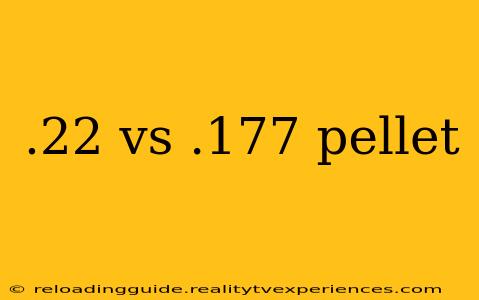.22 vs .177 Pellet Guns: Choosing the Right Caliber for Your Needs
Choosing between a .22 and a .177 pellet gun can feel overwhelming, especially for newcomers to airgunning. Both calibers are popular, but they offer distinct advantages and disadvantages. This comprehensive guide will help you understand the key differences and determine which caliber best suits your shooting style and intended use.
Understanding Caliber Differences
The numbers ".22" and ".177" represent the caliber, or diameter, of the pellet in inches. .177 caliber (4.5mm) is the more common choice globally, while .22 caliber (5.5mm) is gaining popularity. This seemingly small difference in size significantly impacts several aspects of performance.
Power and Penetration
- .22 Caliber: Generally delivers more power and greater penetration than .177. This makes it a better choice for hunting small game or pest control, where a more substantial impact is required for a clean kill. The larger pellet also retains more energy over longer distances.
- .177 Caliber: Offers less stopping power but boasts higher velocity. This results in flatter trajectories at longer ranges, making it ideal for target shooting and plinking. The lighter pellet also means less recoil.
Accuracy and Precision
Both calibers are capable of impressive accuracy, but factors like the quality of the pellet and the airgun itself play a larger role than the caliber itself.
- .177 Caliber: Due to its lighter weight and higher velocity, .177 pellets can be more susceptible to wind drift. However, with a good quality airgun and consistent shooting technique, excellent accuracy is achievable.
- .22 Caliber: The heavier pellet provides better stability in windy conditions, potentially leading to more consistent accuracy over longer distances.
Pellet Availability and Cost
- .177 Caliber: Enjoy far wider availability and generally lower cost per pellet. You'll find a much broader selection of pellet types and weights.
- .22 Caliber: While readily available, the selection is usually smaller, and pellets often cost slightly more.
Which Caliber is Right for You?
The ideal choice depends heavily on your intended use:
Choose .177 caliber if:
- You primarily target shoot: Higher velocity and flatter trajectory are advantageous for precision at longer ranges.
- You prioritize cost-effectiveness: Pellet cost and availability are significant factors.
- You prefer a lighter recoil: The lighter pellet reduces felt recoil.
Choose .22 caliber if:
- You need more stopping power: Hunting small game or pest control requires greater penetration.
- You often shoot in windy conditions: Heavier pellets are less affected by wind.
- You prioritize energy retention at longer ranges: The heavier pellet retains more energy.
Beyond Caliber: Other Factors to Consider
While caliber is a key factor, don't overlook these important aspects when selecting a pellet gun:
- Airgun Type: Spring piston, gas ram, or pre-charged pneumatic (PCP) systems all impact power and consistency.
- Power Output (fps): Feet per second (fps) indicates muzzle velocity, affecting range and accuracy.
- Accuracy and Consistency: Test different airguns and pellets to find the best combination for your needs.
- Your Budget: Prices vary significantly based on features, quality, and brand.
By carefully considering these factors, you can select the perfect .22 or .177 pellet gun to meet your specific needs and enjoy hours of accurate and enjoyable shooting. Remember to always practice safe gun handling and follow all applicable laws and regulations.

